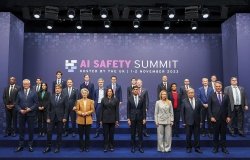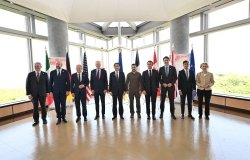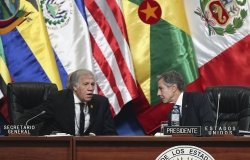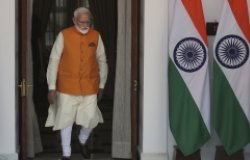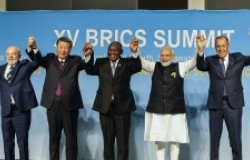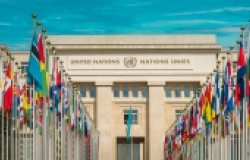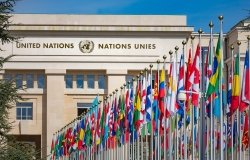Regional Consultation on the Sahel Countries
Bedeviled by chronic food shortages, facing a current drought that will exacerbate that situation, and subject to dislocation due to conflict between various rebel movements, the civilian population of the Sahel is in a state of extreme vulnerability.
Overview
Regional Consultation on the Sahel Countries
Monday, July 16, 2012
On July 16, 2012, Steve McDonald, director of the Wilson Center’s Africa Program and Project on Leadership and State Building, convened a private meeting for policymakers, practitioners, and experts to share perspectives on food and human security in the Sahel region. The guest speaker, David Gressly, Regional Humanitarian Coordinator for the Sahel of the United Nations, presented his analysis of the region, as well as his recommendations for effective solutions. This was the fourth meeting the Africa Program has hosted regarding the Sahel.
Overview
Bedeviled by chronic food shortages, facing a current drought that will exacerbate that situation, and subject to dislocation due to conflict between various rebel movements, the civilian population of the Sahel is in a state of extreme vulnerability. As many flee to safety, the need for humanitarian aid has increased, which in turn has raised the need for international organizations, local governments, and humanitarian aid groups to coordinate their efforts to protect the people they serve. Discussants at the meeting explored topics such as regional cooperation, the creation of humanitarian corridors in areas experiencing heightened violence and the implications of unrest in Mali.
Obstacles in the Sahel
David Gressly opened the discussion by giving an overview of the humanitarian functions of the United Nations (UN). As head coordinator of assistance to the Sahel countries of Senegal, Chad, Burkina Faso, Nigeria, and Mali, Mr. Gressly works with the UN’s humanitarian agencies and regional representatives to support communities in distress. He explained that with the exception of some "difficult" areas in northern Nigeria and Mali, humanitarian workers affiliated with the UN have wide access throughout the region. Gressly said that all related agencies are working to ascertain “what can be done to address the structural issues that are facing food and nutrition security.”
The speaker outlined three major challenges to the Sahel, the first being an “acute food and nutrition crisis." He cited statistics estimating that 18.7 million people across nine countries are struggling with food insecurity. Of that figure, about 1 million are children suffering from malnutrition, with mortality rates between 25-60%. However, food security initiatives for those affected have already received roughly USD$1.3 billion. Gressly attributes this to the global response to the 2011 East Africa food crisis. He said, “The Horn experience shocked a lot of people [and] when [they] realized that a similar situation could happen in the Sahel… an earlier response from government and private donors was coordinated…”
While speaking on the chronic nature of food insecurity and malnutrition, Gressly praised the Sahelian states for their political will and resilience in tackling such debilitating problems, specifically applauding Niger for being honest in regards to the structural difficulties it often encounters. He placed special emphasis on the word “resilience,” describing it as a word sometimes used “like a magic charm.” He insisted that organizations involved in humanitarian work learn to take “resilience” to an operational level and make their various projects and initiatives functional. Once this change takes place, he explained, these groups can then go country-to-country tailoring their strategies to the specific context of each afflicted group.
Gressly described a “real fear that the situation [in the Sahel] is going to worsen from the security point of view.” “As a result of what has happened in Mali, there has been an existential crisis in Niger,” a crisis that has caused the Niger Government to reallocate USD$100 million to security. The Malian government, however, can barely compete with rebels that reportedly have access to funds through drug and arms trafficking. Due to this resource discrepancy, the government is not “concentrating” its power effectively to counter violent groups. Between the Malian government's stagnation and disagreements between international organizations such as the EU, UN, and the Economic Community of West African States (ECOWAS) on how to proceed, Gressly admonished against a “drift over time” that will depress global attention on the Sahel. He said, “Although it is not our responsibility to solve that kind of problem, we need to be able to deal with the consequences…”
Due to the insecurity spreading across the region, it is difficult for aid workers to contain health crises. Gressly spoke of the implications on the ability of humanitarian groups to access affected areas, especially in a region where the proliferation of cholera could reach pandemic levels.
Regional Cooperation
Following Gressly’s presentation, Steve McDonald, director of the Wilson Center’s Africa Program and Project on Leadership and Building State Capacity, probed Gressly on regional cooperation and commitment in the Sahel region by asking, “What are the levels of cooperation that you are encountering with ECOWAS and individual governments while trying to deal with the crisis and the chronic obstacles?”
Gressly responded that “across the board, governments have proven to be quite cooperative,” with the exception of Senegal where humanitarian organizations experienced “a little bit of a delay.” In relation to food, nutrition and refugees, “much more recognition than previous crises” on the part of national governments has been pronounced. He said, “[It is] not so much an issue of cooperation, but how we manage humanitarian intervention.” With regard to ECOWAS, there is a need to deepen relationships within the regional bloc so that cooperation moves beyond the “discussion level.” He also pointed out that regional support is necessary when developing resources such as stockpiles of food and highlighted some of the difficulties faced when that support is not present.
Issues of Access
Alexis Arieff, analyst for the Congressional Research Service, focused on Gressly’s comments about limited access to affected populations that humanitarian aid organizations are experiencing in northern Mali.
“Personal security,” Gressly stated, “is a significant deterrent to people on the ground.” The armed groups controlling northern Mali would rather see Malian forces delivering aid than foreigners. Due to cultural differences, it is difficult for humanitarian workers to know which people to speak with regarding aid, a situation Gressly described as “very ambiguous.” Currently, organizations that have historically maintained operations in Mali, such as the International Committee of the Red Cross (ICRC) and the World Food Program (WFP), have been able to maintain their local staff in country. Major access issues include, the threat of stolen aid exacerbating the situation, the lack of a central database through which risk management programs can track partners, and the absence of local contacts who can guide the UN in maneuvering local government bureaucracy and communities. He recommended the creation of a risk management unit in Bamako to advise “the UN and NGOs on how to mitigate risk and track local and international relationships” to see what strategies are working.
Gressly also emphasized the importance of aid groups on the ground remaining focused on southern Mali as well, noting that nearly 80% of humanitarian operations are concentrating on the more populous South.
Humanitarian Aid and Maintaining Focus
H.E Ambassador Keita of the Republic of Mali asked how the speaker foresees the implementation of aid in terms of a UN humanitarian intervention. Mentioning the lack of the UN or an NGO presence in Timbuktu, the Ambassador asked if there was “any planning or timing for facilitating aid outside of the sphere of the ECOWAS intervention and the current attention on Mali.” Gressly corrected the Ambassador by noting that the United Nations Children’s Fund (UNICEF) was and is present in Timbuktu, though they are in need of facilitating humanitarian access. Gressly explained that current interventions by ECOWAS will help establish what the “humanitarian access would look like,” though rural operations still have to be organized.
H.E. Ambassador Sidikou of the Republic of Niger maintained that he did not “think that the powers that be realized that dialogue needs to be at the center of these humanitarian interventions, otherwise it will be intervention after intervention.” In his opinion, the question of military involvement must come second to dialogue and education. He asked, “How interlinked are these countries in terms of production and stability?”
Gressly informed the participants of the phenomenal movement of refugees in the area as a sign of linkages between countries in the Sahel. Between Mali, Burkina Faso, Algeria and Niger approximately 200,000 people have been displaced. These numbers have surpassed the United Nations High Commission for Refugees’ (UNHCR) worst-case scenario levels, forcing the organization to focus solely on life saving measures. He said, “By the time we realized that we were short on funding for a lot of these programs, it was too late.”
In terms of regional production and stability, Gressly asserted that 99% of efforts need to be done at the country level, explaining that UN organs are working on a regional level while allowing each country to develop an “action plan” to sustain these initiatives over the long term. Gressly mentioned that the goal of UN humanitarian organizations is to help coordinate all of the different groups that have successfully maintained operations, a task he likened to “herding cats.”
Military Interventionin Mali
The event concluded with a brief mention on the escalating steps by the African Union (AU) or the UN Security Council toward sanctioning military action in Mali. Gressly remarked that these measures should entail: working with the transitional government; organizing the army; and helping to regain control of the North. He said, “Ignoring the problem is not going to work,” but attacking this issue militarily, “could have negative implications.” Ambassador Keita added his own proposal for achieving stability, which included preparation for an “inevitable” confrontation with armed groups. Ambassador Sidikou revealed that Mauritania, Mali, Niger and Algeria have planned to meet at the end of July to discuss a new plan of action.
Hosted By

Africa Program
The Africa Program works to address the most critical issues facing Africa and US-Africa relations, build mutually beneficial US-Africa relations, and enhance knowledge and understanding about Africa in the United States. The Program achieves its mission through in-depth research and analyses, public discussion, working groups, and briefings that bring together policymakers, practitioners, and subject matter experts to analyze and offer practical options for tackling key challenges in Africa and in US-Africa relations. Read more
Thank you for your interest in this event. Please send any feedback or questions to our Events staff.

